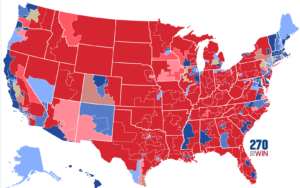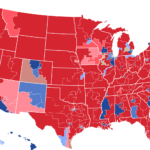With a week to go in the 2016 election, there a host of contested U.S. Senate races that will decide which party will control the upper legislative chamber for the next two years. However, there are six Senate seats that were at one time discussed as being in play, but now have been all but decided. Here is a look at the 2016 Senate races that didn’t matter.
Arizona
(Senator John McCain (R) vs. Rep. Ann Kirkpatrick (D))
Arizona remains in play at the presidential level, as Hillary Clinton would love to ride increased Hispanic voter turnout to an upset victory over Donald Trump in the state. At the senate level, despite raising a respectable $8 million, Congresswoman Ann Kirkpatrick, a moderate Democrat, is trailing veteran Senator and former GOP Presidential nominee John McCain by a sizable margin heading into the final week. Democrats hoped that Kirkpatrick’s moderate record, and experience in Congress would give her a fighting chance against the maverick McCain, who has consistently been able to get crossover and independent support in his home state. However, it does not appear that Kirkpatrick sufficiently motivated enough women in particular to vote for her over McCain.
McCain looks set to survive Trump’s damage to the Arizona GOP with hispanics and moderates, and win what will likely be his final term in the Senate. Kirkpatrick struggled to make an effective case in the messaging department against McCain, and national Dem money and support faded as other races took priority, such as neighboring Nevada. One of the big differences you’ll see between McCain and Trump is the support McCain will get from Arizona’s conservative Mormon community that dislikes Trump. Kirkpatrick hasn’t been over 40% in polling since late Spring where McCain looked to be in some trouble, even with his own base. The McCain camp has done a good job shoring up his support with the base, including Arizona’s large senior population. He easily won what could have been a difficult GOP primary.
Colorado
(Senator Michael Bennett (D) vs. Commissioner Darryl Glenn (R))
The only bright spot for Democrats among these forgotten six Senate races, Colorado’s Democrats, and national Dems have been able to focus on the Presidential race in the state, as Senator Michael Bennett has maintained strong popularity in the growing state and he further lucked out when the Colorado GOP nominated a relative unknown, and far right tea party candidate in Darryl Glenn.
Glenn, an upstart who is linked to the Ted Cruz wing of the Republican party, has been outspent 10 to 1 by Bennett, and his views fit better with conservative talk radio, than the purple state of Colorado. Bennett had a close call against tea partier Ken Buck in 2010, but he should be able to go to bed early next Tuesday. Most polls have Glenn under 40%, on top of low name recognition despite his two years of campaigning for the seat. Two very recent polls actually have this race shockingly close, but those seem to be extreme outliers in the general polling of this campaign. Of all of the races in this article, this is the only one with any potential to surprise us.
Georgia
(Senator Johnny Isakson (R) vs. investment manager Jim Barksdale (D))
Self funding investment manager Jim Barksdale, a multi millionaire, was a late draftee to this senate race for Democrats against popular Republican incumbent Johnny Isakson, a Senate veteran who was more threatened by his own health problems than Barksdale this cycle. Isakson has outspent the newcomer and originally unknown Barksdale 2 to 1 and focused on his constituent service and ability to get things done, avoiding potential problems with being tied to Donald Trump. Barksdale is a greenhorn when it came to campaigning. Dysfunction at the campaign level and a very slow start ensured that Isakson would skate clear. Barksdale actually has an interesting story, as he came to politics due to his opposition to the Iraq War, but he never was able to tell it coherently to voters.
For his part, the Republican realized that Georgia is a changing state politically and has worked hard to cultivate relationships with moderates, and even some Democrats, including former Governor Roy Barnes. Isakson is getting a significant amount of ticket splitters. Isakson rolled in 2010, with the help of Democrats crossing over, and a unified Republican party behind him; he should avoid a runoff that is in play in Georgia once again with the same formula. Georgia requires the winning candidate get 50.1% of the vote on election day to avoid a runoff. The Libertarian party candidate hasn’t gained enough traction among Georgia’s conservatives to draw enough votes to force a runoff. Isakson currently sits right at the 51% he needs to avoid a runoff, and is outpolling Trump in Georgia.
Iowa
(Senator Charles Grassley (R) vs. Former Lieutenant Governor Patty Judge (D))
Yet another experienced female Democratic challenger who struggled to get over 40%, Patty Judge originally looked set to challenge Chuck Grassley, the leading opposition to Obama filling the Supreme Court vacancy before his term ends. Judge, like Kirkpatrick, is a moderate running against a charismatic senate veteran, and her messaging and lack of charisma just hasn’t matched up well. Judge was aiming to pick off Republican and Independent women, but she’s been partly stymied in that effort by Trump’s improving prospects in Iowa, and abysmal fundraising of under barely over $2 million.
Grassley has good relationships in Iowa, a small, family oriented state, and he’s used them to his advantage with a locally focused campaign strategy. Iowa could see a GOP sweep next week and Grassley looks set to win by 10 points or more. Iowa Democrats probably would have been better off with Rob Hogg over Judge as their nominee, Hogg finished second in the Democratic primary.
Kentucky
(Senator Rand Paul (R) vs. Mayor Jim Gray (D))
Jim Gray, the mayor of Kentucky’s second largest city, Lexington, not only was aiming to knock off tea party and libertarian favorite Rand Paul, a former GOP Presidential candidate, he was also taking his shot at being the first openly gay man elected to the US Senate. Things haven’t gone well for him on the campaign trail though, despite raising over 4 million, and having a resume that matches up well with Paul, Gray has struggled to land any lasting blows against him. In their only debate Gray came off as desperate to land punches against Paul, and it didn’t go well. Paul had a tough race against Jack Conway in 2010, but he looks set to beat Gray by 10 or more in this increasingly conservative state.
Strong support for Trump in Kentucky has certainly hurt Democrats and helped Paul. Even if Paul makes another run for President, if he doesn’t win that, he looks to have cemented himself as a Senator in Kentucky for a long time to come. Gray didn’t connect with the voters who are willing to vote Democratic at the state level in Kentucky, including those from rural areas and Kentucky’s coal country.
Ohio
(Senator Rob Portman (R) vs. Former Governor Ted Strickland (D))
Ohio remains in flux at the Presidential level, but surprisingly to some, Senator Rob Portman, who has outspent former Governor Ted Strickland 2 to 1, is flying high. Since late Summer Portman has established and held onto a double digit lead against Strickland. Portman is a relative moderate who has built good relationships in Ohio, and particularly has undercut Strickland among working class white voters. Portman has been endorsed by some of Ohio’s unions, while Strickland has faded in part due to baggage left over from his term as Governor, and his loss to current Governor John Kasich the last time he ran for office. Despite Democrat Sherrod Brown retaining his Senate seat last time, Strickland isn’t having near the same success.
Strickland is 75, and has run a campaign plagued by a lack of enthusiasm and energy. He never found effective messaging against Portman, the Ohio GOP also has a better field and turnout machine than their Democratic counterpart, and Strickland’s charges that Portman doesn’t understand the working man, and doesn’t work hard, just hasn’t resonated with voters. Strickland famously attacked Portman for having “baby soft hands”. Strickland is losing votes with his own base, while Portman looks set to setup ticket splitters who are voting for Hillary, and himself, much the same way John Kasich resoundingly won Ohio’s governor race in 2014 and 2010. Despite stacking the deck for Strickland, and ensuring he dominated the primary, the Ohio Democrats would have been far better off with the fresher face that was Cincinnati Councilman P.G. Sittenfeld. Sittenfeld would have been far more effective at attacking Portman and running closer to Clinton in the Buckeye state. Strickland should have stayed retired rather than this sad effort that lost national Democrats backing months ago. Strickland will lose by 8 points or more.
Main Photo:













